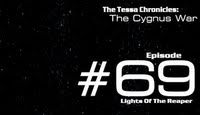
“I need an update, Harrison.” Lazar breathed– nervous, uneasy.
“No change.” Harrsion swallowed, fingers moving, sorting through strings of highlighted holographic data. “They’re both still just sitting there, about fifty meters off the sensor grid.” He turned back, met the Captain’s anxious eyes. “I’m still getting the same intermittent rad spikes, like they’re still in the process of scanning us or...” He paused, bit his lip “something.”
“Are they focusing on anything?” Lazar asked. “The mine?”
“No sir.” Harrison’s fingers pushed through lines of code, worked through to a matrix of data displays, diagrams. “They’re pelting the entire ship with equal amounts of radiation– same levels of saturation, same waveform... all the same, all across the board.”
“Is it some kind of weapon?” Lazar glanced back at Kerrigan, caught the Tactical officer’s eye as he looked up from his own display.
“If it is, it’s unlike any weapon I’ve ever seen.” Kerrigan shook his head, turned back to his console, wove fingers through a handful of displays. “The spikes don’t penetrate more than a couple meters of hull– and even then, exposure has such a negligible impact that internal sensors hardly read it.” Kerrigan looked up. “I mean, if someone was EVA right now, they could get sick with a couple of hours of direct exposure, maybe, but that’s it.” He paused, shrugged. “I can’t say for sure, but my gut tells me it’s not a weapon– they’re doing something else.”
“And they’re both hitting us with these ‘spikes’?” Lazar turned back to Harrison, got a quick nod in response.
“They’ve positioned themselves on either side of us for maximum coverage.” Harrison shook his head. “Each is only hitting about fifty percent of our hull, but between the two of them, they’re saturating every inch out there.”
“And you said earlier that it looks like some kind of scanning procedure?” Lazar asked, crossing the deck back to Harrison. The navigator glanced back, nodded.
“That’s my best guess anyway.” Harrison breathed a sigh, sorted through another sequence of holographic data. “There isn’t much in the database on Coralate technology, and nothing on close encounters with warships.” He shook his head, glanced up at Lazar again. “If anyone besides us has been within five-hundred meters of a Coralate warship, they haven’t lived to tell about it.”
“That’s reassuring.”
Harrison grinned. “Tell me about it.”
“Well, whatever it is they’re doing is throwing off the EM field bubble where it passes through the hull and into space.” Anderton shook his head. “I don’t think it’s a strong enough interruption to do any real damage to our systems, even if the degen-drive was powered up to max, but I’m... getting some weird readings of bizarre quantum behavior where they meet...” Anderton shook his head, fingers paging through readings, mind working, trying to sort it all out, to make sense of the data. “Almost... it’s almost as if the rad spikes from the Cygnan ships are eating into our EM wake. Like they’re...”
“Oh my god.” Kerrigan leaned into his console, stared into lines of holographic code. He swallowed, looked up, met the stare that Lazar had already pinned on him. “I know what it is. I know what they’re doing.”
“Sir, I’m getting–” Harrison’s fingers hung in the holographic display, paused between shifts of neon data as he turned back toward the Captain.
“One crisis at a time.” Lazar spared Harrison the barest glance, turned back to cross the distance between himself and the Tactical officer. “Kerrigan! What the hell is going on?”
“They’re... those rad spikes...” Kerrigan gestured vaguely. “They’re not a scan– they’re... eroding the hull, sir.” He swallowed, fingers working through new data. “Oh god. it’s... they’re creating entry points...”
“What?” The Captain’s eyes lit with fear, fire. Hands clenched at his sides. “How?”
“Woah, yeah... oh man.” Harrison’s fingers came alive again, shuffled through data, highlighted sections, worked through spot analysis subroutines. “He’s right. I see it now. It’s like... a subatomic erosion.” Harrison tore his eyes away from his own data, turned back to meet the Captain’s glance, gestured. “Think about it– water hits a rock face, the weakest area gives way first, opens a hole in the rock face.” He shook his head. “It’s environmental entropy, speeded up by a factor of thousands...” He hesitated, eyes becoming distant. “Millions.”
“I thought you said it wasn’t causing any damage to the hull!” Lazar snapped.
“It’s not.” Kerrigan spoke up again. “Oh god, that’s why we didn’t detect it! That’s why we didn’t see what they were doing.” He clenched his teeth, pushed aside a series of holographic displays and called up a sequence of new data. “They’re destabilizing the metal on a subatomic level by selectively saturating and breaking the bonds between particles. We didn’t detect it at first because the effect is so small– it’s not destroying the hull,” he looked up, met Lazar’s eyes in a single, pointed stare. “it’s making it softer.”
“Softer?”
“Sir, we have another problem.” Harrison broke in, half-turning in his chair to face the Admiral. “I’m getting a charge reading from the two Coralate ships.”
Lazar spun abruptly back, confronted the dead viewscreen with sweaty hands, frightened, breathless eyes. “Weapons?”
“No sir.” Harrison turned back, sifted through glowing data. “The two ships are moving again, they–” He paused, face paling. “Oh no.” He swallowed. “Oh, not good. Slow, flat approach.” He looked up again, met the Captain’s eyes with an equal dose of fear, pain. “I know this maneuver, sir.”
“So do I.” Lazar breathed, turned toward Baker, saw the terror in her eyes, the way her skin had turned ashen, the way her hands shook in the holographic interface. “Baker, full alert.” He swallowed against the knot that had lodged itself in his throat, the knot that hardened with every passing second. “Put out the call.”
He looked back, stared into the depthless black of the dead viewscreen.
“We’re about to be boarded.”





